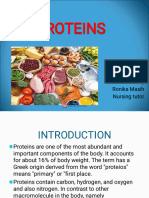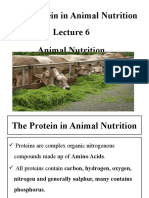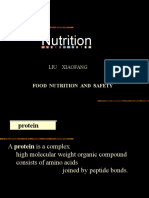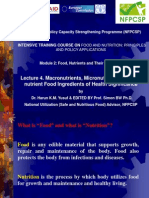Proteins Are Essential Nutrients For The Human Body
Proteins Are Essential Nutrients For The Human Body
Uploaded by
vaisakh777Copyright:
Available Formats
Proteins Are Essential Nutrients For The Human Body
Proteins Are Essential Nutrients For The Human Body
Uploaded by
vaisakh777Original Description:
Original Title
Copyright
Available Formats
Share this document
Did you find this document useful?
Is this content inappropriate?
Copyright:
Available Formats
Proteins Are Essential Nutrients For The Human Body
Proteins Are Essential Nutrients For The Human Body
Uploaded by
vaisakh777Copyright:
Available Formats
PROTIEN Proteins are essential nutrients for the human body.
[1] They are one of the building blocks of body tissue, and can also serve as a fuel source. As fuel, proteins contain 4 kcal per gram, just like carbohydrates and unlike lipids, which contain 9 kcal per gram. Proteins are polymer chains made of amino acids linked together by peptide bonds. In nutrition, proteins are broken down in the stomach during digestion by enzymes known as proteases into smaller polypeptides to provide amino acids for the body, including the essential amino acids that cannot be biosynthesized by the body itself.[2] Amino acids can be divided into three categories: essential amino acids, non-essential amino acids and conditional amino acids. Essential amino acids cannot be made by the body, and must be supplied by food. Non-essential amino acids are made by the body from essential amino acids or in the normal breakdown of proteins. Conditional amino acids are usually not essential, except in times of illness, stress or for someone challenged with a lifelong medical condition. Essential amino acids are leucine, isoleucine, valine, lysine, threonine, tryptophan, methionine, phenylalanine and histidine. Non-essential amino acids include alanine, asparagine, aspartic acid and glutamic acid. Conditional amino acids include arginine, cysteine, glutamine, glycine, proline, serine, and tyrosine.[3] Amino acids are found in animal sources such as meats, milk, fish and eggs, as well as in plant sources such as whole grains, pulses, legumes, soy, fruits, nuts and seeds. Vegetarians and vegans can get enough essential amino acids by eating a variety of plant proteins.[3]
You might also like
- Feel Free To Add/edit. You Can Also State Your References So We Can Check It Out.Document4 pagesFeel Free To Add/edit. You Can Also State Your References So We Can Check It Out.Mat NeriNo ratings yet
- Pro TiensDocument11 pagesPro TiensBk Anubhav GuptaNo ratings yet
- ProteinDocument8 pagesProteinishantkumar1574No ratings yet
- Proteins: Protein CompositionDocument6 pagesProteins: Protein Compositiongeorgejhon1949No ratings yet
- Proteins Are Polymers of Amino AcidsDocument2 pagesProteins Are Polymers of Amino AcidsBitancor JemimaNo ratings yet
- ProteinsDocument28 pagesProteinsMuskan TiwariNo ratings yet
- metabolism of proteinDocument41 pagesmetabolism of proteinkalmanesumanth6No ratings yet
- General Amino Acids Pool and UtilizationDocument61 pagesGeneral Amino Acids Pool and UtilizationBaylon, MarkNo ratings yet
- ProteinDocument25 pagesProteinMohaajanan AliNo ratings yet
- GST 104 ReproductionDocument22 pagesGST 104 ReproductionPraise GodsonNo ratings yet
- ProteinDocument16 pagesProteinBer Anne Jaropojop TahilNo ratings yet
- DOC-20240416-WA0022.Document13 pagesDOC-20240416-WA0022.juniorsalim126No ratings yet
- Proteins Wps OfficeDocument22 pagesProteins Wps Officewesleywere85No ratings yet
- ProteinDocument17 pagesProteinBasira ZolmayNo ratings yet
- AminoDocument2 pagesAminoJohn Paul BartolomeNo ratings yet
- Essential Amino AcidsDocument23 pagesEssential Amino AcidsJamesBuensalidoDellavaNo ratings yet
- ProteinDocument22 pagesProteinNarayan GhimireNo ratings yet
- File 1667187373 0008901 ProteinsDocument8 pagesFile 1667187373 0008901 ProteinsSachin Kumar RaiNo ratings yet
- Nutrition: Liu XiaofangDocument30 pagesNutrition: Liu Xiaofangyeyen100% (1)
- البروتيناتDocument80 pagesالبروتيناتaref alsakkafNo ratings yet
- Protein TextDocument8 pagesProtein TextShine ButconNo ratings yet
- Amino Acids What Are They?Document4 pagesAmino Acids What Are They?annafcqNo ratings yet
- Group 2 ProteinsDocument30 pagesGroup 2 ProteinslaarnieNo ratings yet
- Indian Diet PlanDocument26 pagesIndian Diet Plansanskar sinhaNo ratings yet
- ProteinsDocument17 pagesProteinsMaribel Membrado GreciaNo ratings yet
- ProteinDocument39 pagesProteinNICHOLE MOJELLO100% (2)
- Know The Proteins You Consume!Document2 pagesKnow The Proteins You Consume!pincdelhi01No ratings yet
- ProteinDocument33 pagesProteinIhsan Badsha100% (1)
- PROTEINS IntroductionDocument18 pagesPROTEINS IntroductionBrysin AENo ratings yet
- FEM 3202-4 ProteinDocument26 pagesFEM 3202-4 ProteinRon Chong0% (1)
- 6 ProteinsDocument20 pages6 Proteinsdanishg5820No ratings yet
- ProteinsDocument3 pagesProteinsstudents athloneNo ratings yet
- Unit Iii. Amino Acids and Proteins Discussion PointsDocument6 pagesUnit Iii. Amino Acids and Proteins Discussion Pointsalina20No ratings yet
- Carbohydrate and Protein: Week 5 Pe UphcDocument9 pagesCarbohydrate and Protein: Week 5 Pe UphcKelvin TanuwijayaNo ratings yet
- Lecture 9 ProteinDocument25 pagesLecture 9 Protein74qff48yzfNo ratings yet
- Nutrition Nursing: ProteinsDocument38 pagesNutrition Nursing: ProteinsAngelyka Nicole Bengco David100% (1)
- ProteinsDocument5 pagesProteinsJoshua EclarinoNo ratings yet
- PROTEINSDocument58 pagesPROTEINSHannalette GibanNo ratings yet
- GST 104 LectureDocument22 pagesGST 104 LectureOLUWASEYI OJUOLANo ratings yet
- 4 Proteins 2Document66 pages4 Proteins 2Aysun AlizadehNo ratings yet
- Protein Proteins Are Essential Nutrients For The Human Body. They Are One of TheDocument8 pagesProtein Proteins Are Essential Nutrients For The Human Body. They Are One of TheKaustubh MoreNo ratings yet
- Macronutrientsn 2022Document45 pagesMacronutrientsn 2022doyoumatterindeedNo ratings yet
- NutritionDocument133 pagesNutritionSumit VashishtNo ratings yet
- ProteinsDocument42 pagesProteinsshivagoyal516No ratings yet
- Bch 201_med 202.1 Amino_proteins ModDocument32 pagesBch 201_med 202.1 Amino_proteins Modcodymike24434No ratings yet
- The Macronutrients-11: Proteins A N D Fats: Omino OcidsDocument10 pagesThe Macronutrients-11: Proteins A N D Fats: Omino OcidsasndmpNo ratings yet
- PROTEIN AND WATER (Updated)Document17 pagesPROTEIN AND WATER (Updated)abahojomacynthiaNo ratings yet
- Nutrition Lesson 3 ProteinDocument9 pagesNutrition Lesson 3 ProteinmayowaayetowoNo ratings yet
- Group1 ProteinsDocument20 pagesGroup1 ProteinsROG - Bortanog CarylNo ratings yet
- Macronutrients and MicronutrientsDocument49 pagesMacronutrients and MicronutrientsrahmarosyidahNo ratings yet
- NutritionDocument68 pagesNutritiondharmendrachakravarti499No ratings yet
- Unit 2proteins 190606112643 PDFDocument20 pagesUnit 2proteins 190606112643 PDFbhagwatNo ratings yet
- ROBELLE DANA 1BSN-A Biochemistry AssignmentDocument5 pagesROBELLE DANA 1BSN-A Biochemistry AssignmentRobelle Santia DanaNo ratings yet
- Midterm (Protein, Carbs&Lipids)Document132 pagesMidterm (Protein, Carbs&Lipids)Yo1No ratings yet
- 2.2 ProteinsDocument35 pages2.2 ProteinsAzalea BitchNo ratings yet
- Inbound 2949823744268348325Document15 pagesInbound 2949823744268348325Tristan SiocoNo ratings yet
- Amino AcidsDocument4 pagesAmino Acidsshanmukhk54No ratings yet
- Digestive System: A Tutorial Study GuideFrom EverandDigestive System: A Tutorial Study GuideRating: 5 out of 5 stars5/5 (1)
- Olympic Sports Are Contested in TheDocument1 pageOlympic Sports Are Contested in Thevaisakh777No ratings yet
- Javagal SrinathDocument1 pageJavagal Srinathvaisakh777No ratings yet
- Harbhajan Singh PlahaDocument2 pagesHarbhajan Singh Plahavaisakh777No ratings yet
- Manchester United Football ClubDocument1 pageManchester United Football Clubvaisakh777No ratings yet
- Umeshkumar Tilak YadavDocument1 pageUmeshkumar Tilak Yadavvaisakh777No ratings yet
- Anil Kumble (: Indian Cricket WisdenDocument2 pagesAnil Kumble (: Indian Cricket Wisdenvaisakh777No ratings yet
- Shikhar DhawanDocument1 pageShikhar Dhawanvaisakh777No ratings yet
- Ajinkya Madhukar RahaneDocument1 pageAjinkya Madhukar Rahanevaisakh777No ratings yet
- Arjun KapoorDocument1 pageArjun Kapoorvaisakh777No ratings yet
- Forbes India: Sonam Kapoor (Document1 pageForbes India: Sonam Kapoor (vaisakh777No ratings yet
- Shahid Kapoor (Khattar, Is An Indian Actor Who Appears inDocument1 pageShahid Kapoor (Khattar, Is An Indian Actor Who Appears invaisakh777No ratings yet
- Ravindrasinh Anirudhsinh JadejaDocument1 pageRavindrasinh Anirudhsinh Jadejavaisakh777No ratings yet
- Ranbir KapoorDocument1 pageRanbir Kapoorvaisakh777No ratings yet
- Hrithik Roshan (: / Rɪtɪk Rɒʃən/ Bollywood Rakesh RoshanDocument1 pageHrithik Roshan (: / Rɪtɪk Rɒʃən/ Bollywood Rakesh Roshanvaisakh777No ratings yet
- Ravichandran AshwinDocument2 pagesRavichandran Ashwinvaisakh777No ratings yet
- Suresh Raina (: PronunciationDocument1 pageSuresh Raina (: Pronunciationvaisakh777No ratings yet
- Virender Sehwag: Help InfoDocument2 pagesVirender Sehwag: Help Infovaisakh777No ratings yet
- Rohit Gurunath SharmaDocument1 pageRohit Gurunath Sharmavaisakh777No ratings yet
- FiberDocument1 pageFibervaisakh777No ratings yet
- Impact Test ExcemptionDocument1 pageImpact Test Excemptionvaisakh777No ratings yet
- Rahul Dravid (: WisdenDocument2 pagesRahul Dravid (: Wisdenvaisakh777No ratings yet
- Buoyancy: Science / Bɔɪ - Ənsi/ WeightDocument1 pageBuoyancy: Science / Bɔɪ - Ənsi/ Weightvaisakh777No ratings yet
- Laser Beam WeldingDocument2 pagesLaser Beam Weldingvaisakh777No ratings yet
- Carrot: Daucus CarotaDocument1 pageCarrot: Daucus Carotavaisakh777No ratings yet
- AlmondDocument1 pageAlmondvaisakh777No ratings yet
- Vitamin C: Vitamin C or - Ascorbic Acid, or Simply Ascorbate (TheDocument1 pageVitamin C: Vitamin C or - Ascorbic Acid, or Simply Ascorbate (Thevaisakh777No ratings yet
- Vitamin D: Vitamin D Is A Group of Fat-SolubleDocument1 pageVitamin D: Vitamin D Is A Group of Fat-Solublevaisakh777No ratings yet
- Flowering Plant Amaranthaceae Asia Annual Plant Biennial LeavesDocument1 pageFlowering Plant Amaranthaceae Asia Annual Plant Biennial Leavesvaisakh777No ratings yet
- Reciprocating CompressorDocument1 pageReciprocating Compressorvaisakh777No ratings yet
























































































